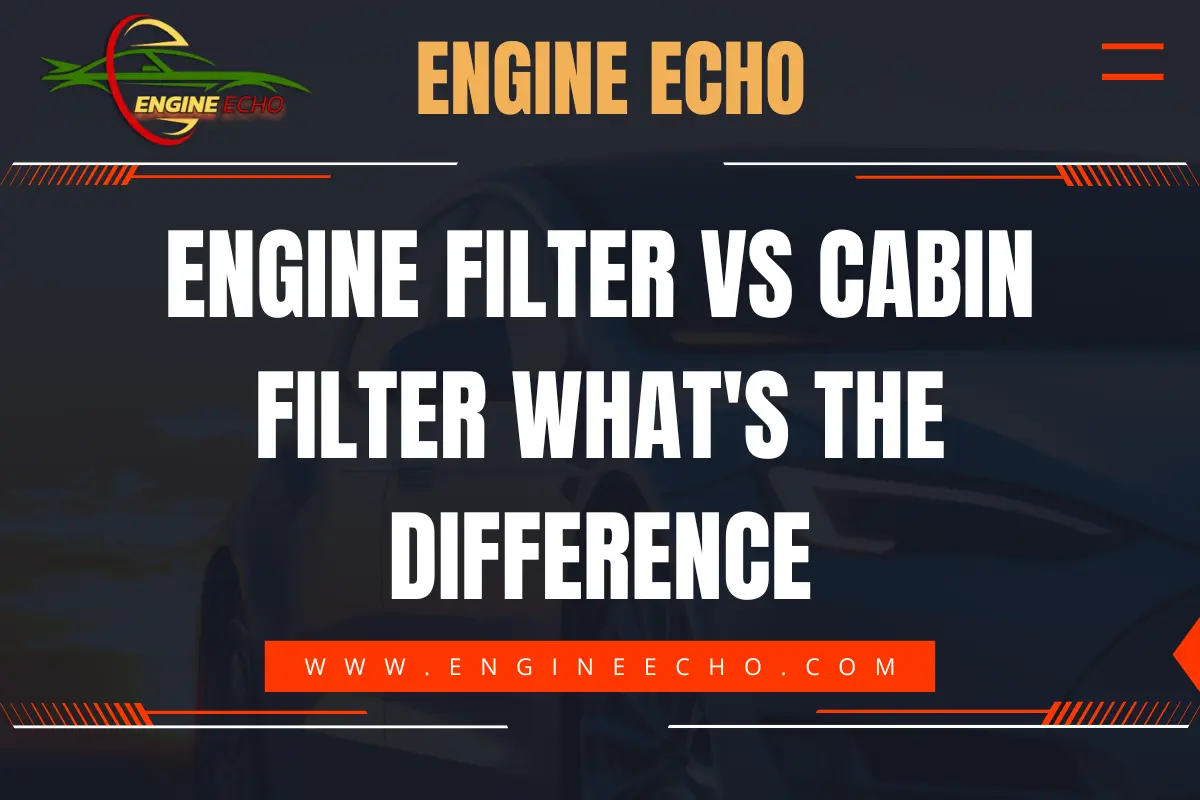Engine Filter vs Cabin Filter: What’s the Difference?

Key Takeaways:
- Engine filters protect your engine from dust and debris, which can affect performance and longevity.
- Cabin filters clean the air inside your car, ensuring you breathe easier, especially if you have allergies.
- A dirty engine filter can reduce fuel efficiency and affect acceleration, while a clogged cabin filter can make the air inside your car feel stale.
- Regular maintenance of both filters is essential to avoid bigger problems down the line.
- Investing in quality filters can save you money and improve your driving experience in the long run.
Introduction
Let me be honest—when I first started driving, I didn’t give much thought to my car’s filters. As long as the engine was running and the air conditioning felt fine, I figured everything was in order. It wasn’t until I had some unexpected issues that I realized how important these small components really are. If you’ve ever neglected a filter like I did, you’ll understand why I’m writing this article: to make sure others don’t learn the hard way. Let’s break down the differences between engine and cabin filters, and why both are essential for your car’s health and your comfort.
1. Understanding Engine Filters
What is an Engine Filter?
The engine filter is a small part with a big job—it keeps harmful particles like dust and dirt from entering your engine. I used to think that this was just one of those things mechanics try to upsell you on, but after a few costly repairs, I realized how critical it is. Engine filters come in different types, such as air, oil, and fuel filters, each playing its own role in keeping your engine clean and efficient.
How Engine Filters Work
Think of your engine filter as your car’s defense system. It traps contaminants before they reach the engine, ensuring that clean air and fuel mix properly for combustion. When the air filter is clogged, the engine has to work harder, and you can definitely feel it when driving. I remember the first time I ignored this—my car felt sluggish, and my fuel bill skyrocketed. A quick filter change solved the problem, and it’s been smooth sailing ever since.
Importance of a Clean Engine Filter
A clean engine filter does more than just keep your engine running—it keeps it running efficiently. I’ve experienced the difference myself. The minute I replaced my dirty filter, my car’s acceleration picked up, and my gas mileage improved. It’s such a small thing, but it makes a huge impact on your car’s overall performance.
2. Understanding Cabin Filters
What is a Cabin Filter?
If you’ve ever wondered why the air inside your car smells musty or why your allergies flare up when you’re driving, it’s probably because of a dirty cabin filter. Cabin filters clean the air that flows into your car, trapping dust, pollen, and even exhaust fumes. For years, I didn’t even know my car had one! Once I changed it, the difference was night and day—cleaner air and no more sneezing during long drives.
How Cabin Filters Work
Cabin filters work quietly in the background, cleaning the air that comes through your car’s HVAC system. Some filters even come with activated carbon to help absorb bad odors and harmful gases. Trust me, if you’ve ever had that “old car smell,” a new cabin filter can fix it.
Importance of a Clean Cabin Filter
A clean cabin filter is a game changer, especially if you have allergies. I used to dread driving in spring because my car would turn into a pollen trap. Replacing the cabin filter changed that completely. Now, the air inside my car stays fresh, and I can enjoy the ride without worrying about sneezing fits.
3. Engine Filter vs Cabin Filter: Key Differences
Function
- Engine Filter: It protects the engine by filtering out dust and debris from the air or fuel.
- Cabin Filter: It cleans the air that you and your passengers breathe inside the car.
Location
- Engine Filter: Found under the hood, close to the engine.
- Cabin Filter: Usually located behind the glove compartment or near the HVAC system.
Composition
- Engine Filter: Made from durable materials that trap larger particles.
- Cabin Filter: Finer, sometimes with activated carbon to filter out tiny pollutants and neutralize odors.
Although both filters serve different purposes, they are equally important for keeping your car running smoothly and ensuring a comfortable ride.
4. Signs of a Dirty Engine Filter
Reduced Engine Performance
One day, my car’s acceleration just wasn’t there. It was like driving with a parachute attached. After some checking, I found the engine filter was clogged with dust and dirt. A quick swap fixed the problem immediately. If your car feels sluggish, it’s a good idea to check your engine filter first.
Unusual Engine Noises
Sometimes, a clogged engine filter can cause weird noises, like a whistling sound when your engine is running. It’s a sign that your engine isn’t getting enough air and is struggling to compensate. I’ve learned that these odd sounds are your car’s way of asking for help—usually in the form of a clean filter.
Check Engine Light
A dirty engine filter can also trigger your check engine light. If you see this light, don’t panic, but definitely check your filter. I’ve had this happen, and it’s always a relief when the fix is as simple as changing the filter.
5. Signs of a Dirty Cabin Filter
Reduced Airflow in HVAC System
If your AC is cranked up, but the air coming out of the vents feels weak, it’s probably because your cabin filter is clogged. I’ve made this mistake before—thinking my AC needed fixing when all I had to do was replace the filter.
Unpleasant Odors
That stale or musty smell inside your car could be due to a dirty cabin filter. I once ignored this, thinking it was just the weather or something else, but after changing the filter, the smell disappeared almost instantly.
Increased Allergic Reactions
If you or your passengers are sneezing or coughing more than usual, it might be because your cabin filter isn’t doing its job. A quick replacement made a huge difference in my car, especially during allergy season.
6. Maintenance Tips for Engine Filters
How Often to Replace
I’ve found that the best rule of thumb is to change your engine filter every 15,000 to 30,000 miles, depending on where you drive. If you’re often in dusty areas, you might need to replace it more often. It’s a small investment for keeping your engine in top shape.
DIY vs Professional Replacement
Engine filters are usually easy to replace yourself, and I’ve done it plenty of times. If you’re not into DIY, though, a mechanic can do it quickly and for a reasonable price. Either way, it’s worth it.
Cleaning or Replacing?
Some engine filters can be cleaned and reused, but I prefer replacing them. A new filter just gives me peace of mind, knowing that my engine is protected.
7. Maintenance Tips for Cabin Filters
How Often to Replace
Cabin filters need changing about once a year or every 12,000 to 15,000 miles. I usually check mine when I notice the air inside the car feeling stuffy. It’s such a simple fix, and it makes a big difference in air quality.
Easy DIY Replacement
Replacing a cabin filter is one of the easiest DIY tasks you can do. I was surprised by how simple it was the first time I did it. All it takes is a few minutes, and you’ll notice the difference immediately.
Cleaning Activated Carbon Filters
If you have an activated carbon filter, regular cleaning can extend its life. This helps keep your car smelling fresh and free of harmful gases.
8. Cost Comparison: Engine Filter vs Cabin Filter
Cost of Engine Filters
Engine filters can cost anywhere from $10 to $70. I’ve learned the hard way that going for the cheaper option sometimes means replacing it more often. These days, I invest in a good brand, and it lasts longer.
Cost of Cabin Filters
Cabin filters are a bit cheaper, usually ranging from $15 to $40. If you want one with activated carbon for better odor control, it’ll cost a little more, but in my opinion, it’s worth it.
9. How Dirty Filters Affect Overall Vehicle Performance
Impact on Engine Efficiency
A dirty engine filter forces your engine to work harder, which burns more fuel. After changing mine, I saw an immediate improvement in fuel efficiency. It’s amazing how something so small can make such a big difference.
Impact on Passenger Comfort
Driving with a dirty cabin filter can make your car feel stuffy, and it makes the HVAC system work harder. Once I replaced mine, the AC worked much better, and the air inside the car was noticeably fresher.
Potential Long-term Damage
Neglecting your filters can lead to serious issues, like engine overheating or even damage to other components. I’ve seen this happen, and trust me, it’s much easier and cheaper to change a filter than to repair an overheated engine.
10. Environmental Impact of Engine and Cabin Filters
Engine Filter Disposal
Used engine filters can contain oil and fuel residues, so it’s important to dispose of them properly. I always take mine to a recycling center or auto shop that handles hazardous waste.
Cabin Filter Disposal
Cabin filters, especially those with activated carbon, can be recycled. It’s a small step, but recycling helps reduce the environmental impact of your car’s maintenance.
11. Choosing the Right Filter for Your Vehicle
Best Engine Filters on the Market
I’ve tried a few different brands over the years, and I’ve found that K&N and Bosch offer the best performance. They last longer and provide better protection for your engine, which is well worth the extra cost.
Best Cabin Filters on the Market
For cabin filters, I recommend Bosch and ACDelco. These brands have worked great for me, especially when it comes to filtering out odors and improving the air quality inside the car.
OEM vs Aftermarket Filters
While aftermarket filters can be cheaper, I usually go with OEM filters because they fit better and last longer. It’s one of those cases where you get what you pay for.
12. Case Studies: Engine and Cabin Filter Failures
Real-Life Examples of Engine Damage Due to Neglected Filters
I once ignored my engine filter for too long, and it led to overheating. The repairs were costly, and I realized I could’ve avoided all of it by simply replacing the filter on time. Lesson learned.
Passenger Discomfort from a Dirty Cabin Filter
Another time, I had a friend complain about the stale air in my car. I hadn’t replaced the cabin filter in ages, and it showed. Once I changed it, the air was fresh again, and my friend noticed the difference immediately.
Conclusion
Maintaining your engine and cabin filters isn’t just about performance—it’s about comfort, fuel efficiency, and saving money in the long run. From my own experiences, I’ve learned that these small, often overlooked parts play a big role in keeping everything running smoothly. Trust me, replacing your filters regularly is one of the easiest ways to avoid bigger problems down the road.
FAQs
- How often should I change my engine filter?
- Engine filters should generally be replaced every 15,000 to 30,000 miles, but more frequent changes may be necessary in dusty environments.
- Can a dirty cabin filter affect my health?
- Yes, a dirty cabin filter can reduce air quality inside the vehicle, leading to respiratory issues, especially for passengers with allergies or asthma.
- What happens if I don’t change my engine filter?
- A clogged engine filter can reduce engine performance, increase fuel consumption, and potentially cause long-term engine damage.
- Can I clean my cabin filter instead of replacing it?
- Some cabin filters can be cleaned, but many are designed to be replaced. Check the manufacturer’s recommendations for your vehicle.
- Are aftermarket filters as good as OEM filters?
- Aftermarket filters can offer similar performance to OEM filters at a lower cost, but it’s essential to ensure they are compatible with your vehicle.
Thanks for checking out this article on EngineEcho.com! Hope you found this article: "Engine Filter vs Cabin Filter: What’s the Difference?" helpful! If you liked it and want to dive into more car engine topics, head over to our homepage. There's always something new to discover in the world of engines. Enjoy your reading journey!
Check out our previous article: Best 4 Cylinder Engine Trucks






